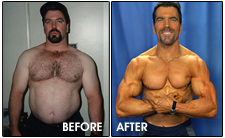|
Muscle Gains for the 'Hard Gainer'
by Scott Abbett |
Are you one of many people with a fast metabolism? Do you feel slowed down in your bodybuilding progress because you can’t seem to “gain weight”? Relax and quit worrying about it; chances are… you’ve been mislead. Let me explain. But you wouldn’t think this difference really mattered to writers of most bodybuilding articles. They just keep pumping out the same simplistic advice. It usually reads something like this:
With this kind of crap being dispensed as natural bodybuilding wisdom, it’s no wonder there are countless trainees getting dismal results. |



